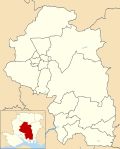Human settlement in England
| Curdridge | |
|---|---|
 Curdridge Church Curdridge Church | |
 | |
| Population | 1,398 (2011) |
| OS grid reference | SU5277113792 |
| Civil parish |
|
| District | |
| Shire county | |
| Region | |
| Country | England |
| Sovereign state | United Kingdom |
| Post town | SOUTHAMPTON |
| Postcode district | SO32 |
| Dialling code | 01489 |
| Police | Hampshire and Isle of Wight |
| Fire | Hampshire and Isle of Wight |
| Ambulance | South Central |
| UK Parliament | |
| 50°55′17″N 1°15′02″W / 50.9213°N 1.2506°W / 50.9213; -1.2506 | |
Curdridge is a village and civil parish within the City of Winchester district of Hampshire, England. The parish also contains the similarly named village of Curbridge. The village has a small school. The parish is located eight miles to the east of Southampton and had a population of 1,292 people in 473 households in the 2001 census, the population increasing to 1,398 in 520 households at the 2011 Census. Curdridge is also known for its annual Curdridge Country Show that takes place in a field off Reading Room Lane
Although named after the nearby village of Botley, Botley railway station is actually located in the civil parish of Curdridge.
History
On 11 February 2024, a large fire destroyed a historic mansion in the village. No injuries were reported.
Geography
The village of Curdridge itself is 2.0 km (1.25 mi) northeast of Botley, and is on the B3051 road. The A334 passes through the southern portion of the parish. Travelling from west to east the A334 enters the parish as it crosses the River Hamble near Botley. It exits the parish, 1.75 km (1.09 mi) later as it crosses Kitnocks Gully immediately east of Lake Road. The B3051 forks off the A334 100m northeast of Botley railway station. The B3051 carries on in a generally northeast direction for approximately 2.9 km (1.8 mi) exiting the parish 100m northeast of Harfield Bungalow. Within the parish the B3051 is named Botley Road. Curdridge Lane is a road, generally wider than 4m, which crosses the parish west to east. Curdridge Lane begins at the B3051 junction with Calcot Lane. Curdridge Lane passes The Cricketers Public House, crosses the course of an old Roman road and marks the boundary of the parish for approximately 190 m (620 ft), before it makes a complete change of direction and leaves the parish at Yew Tree Farm.
Governance
The village is part of the civil parish of Curdridge and is part of the Owslebury and Curdridge ward of the City of Winchester non-metropolitan district, and the Meon Valley division of Hampshire County Council.
Church
The village Church is the church of St Peter. It was largely built in 1887 and 1888 to a design by Thomas Graham Jackson. A tower was added in 1895.
Folklore and local legends
The local legends of two women with tragic lives are often mixed and confused in the village's folklore.
Kitty Nocks
According to local legend, Kitnocks Hill, on the Wickham road, takes its name from a young girl called Kitty Nocks, or some variation thereof, who drowned, either by suicide or accident while eloping with a lover of whom her father did not approve. Her ghost, reportedly seen by locals returning from Southampton on the bus, is now said to haunt the top of the hill.
Kate Hunt
According to local legend, Mill Hill on the Botley road was, in the 17th century, home to an elderly witch called Kate Hunt, who moved felled trees with magic, rode to Bishops Waltham on a farm gate and changed into a white hare. The elderly woman was found dead after locals from Pink Mead Farm shot the hare with a silver coin.
References
- ^ "Civil Parish population 2011". Neighbourhood Statistics. Office for National Statistics. Retrieved 13 December 2016.
- ^ "Hampshire's Local Pages:Curdridge". Archived from the original on 10 February 2008. Retrieved 23 November 2007.
- "# 2001 Census: Key Statistics". Office for National Statistics. Retrieved 23 November 2007.
- "The Curdridge Country Show". Retrieved 14 June 2012.
- "Election Maps". Ordnance Survey. Retrieved 12 August 2022.
- "Property destroyed by large fire". BBC News. Retrieved 12 February 2024.
- "Mansion in Hampshire village badly damaged by large fire". ITV Meridian. 12 February 2024.
- Street map
- legal record of public rights of way in Hampshire - sheet 1309 (PDF) (Map). 1 : 10,000. Cartography by Ordnance Survey. Hampshire County Council. 2008. Retrieved 6 November 2010.
- "Your Councillors". 30 April 2022.
- "Containing areas from mapit.mysociety.org". 2010. Retrieved 6 November 2010.
- ^ O’Brien, Charles; Bailey, Bruce; Pevsner, Nikolaus; Lloyd, David W. (2018). The Buildings of England Hampshire: South. Yale University Press. pp. 235–236. ISBN 9780300225037.
- ^ O'Leary, Michael (2011). Hampshire and Isle of Wight Folk Tales. The History Press. ISBN 978-0752461236.
| Electoral wards and parishes in the City of Winchester District, Hampshire, England (since 2016 boundary changes) | ||
|---|---|---|
 Wards Wards Parishes Parishes | Wonston and Micheldever | |
| The Worthys | ||
| Alresford and Itchen | ||
| Winchester |
| |
| Badger Farm and Oliver's Battery | ||
| Colden Common and Twyford | ||
| Upper Meon Valley | ||
| Bishops Waltham | ||
| Central Meon Valley | ||
| Whiteley and Shedfield | ||
| Denmead | ||
| Southwick and Wickham | ||
| (Wards ordered from north-west corner, across the map, and then progressively south and east) | ||
